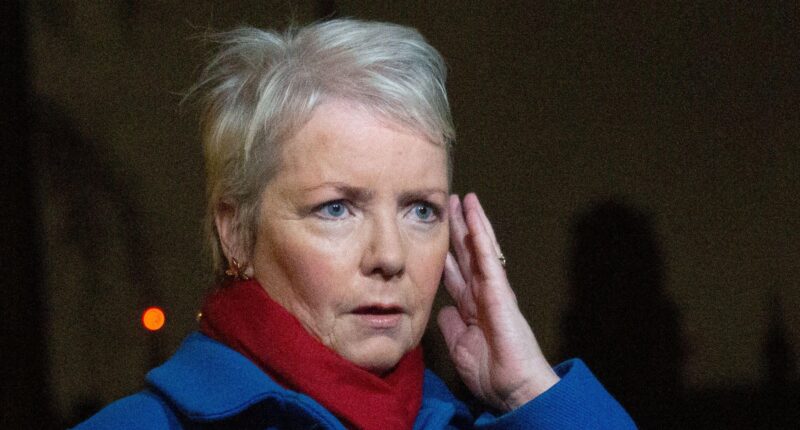A BUNGLING Health Minister today could not answer which changing rooms a trans person should use.
Confused Karin Smyth also struggled to determine whether trans people should be treated the same as women in hospitals.



It comes a day after the Supreme Court ruled that trans women are NOT women.
In a landmark judgement it was unanimously determined that “sex is binary” and female-only spaces must be protected on the basis of biology.
Ms Smyth was asked about the ruling’s impact on previous NHS guidance regarding the accommodation of trans people according to their legally recognized gender. She mentioned that the guidance in question is an appendix to earlier guidance, and highlighted the importance of ensuring that trans individuals are treated with privacy and dignity within the NHS.
“But the ruling is very clear that sex means biological sex, and… the NHS will obviously be complying with that as every other public body will.”
When questioned separately about whether trans women should use female changing rooms, Ms Smyth emphasized the importance of following the law to provide clarity for women, service providers, and considering the specific circumstances of the service providers.
“Large organisations, smaller organisations, many smaller organisations.”
Despite several attempts to clarify the implications of the ruling for the NHS, Ms Smyth eventually stated during an interview with LBC that individuals in hospitals, especially on wards, should be placed in single-sex spaces for accommodation.
Britain’s equality watchdog is rushing to rewrite its rulebook after the court ruling shook up the law on sex and gender.
The Equalities and Human Rights Commission (EHRC) says it’ll urgently update its guidance — as ministers face mounting pressure to spell out what the verdict means for schools, hospitals and workplaces.
Baroness Falkner, who chairs the EHRC, said the impact of the ruling “cannot be overstated” and vowed a rapid review of the watchdog’s advice to reflect the fresh legal clarity.
Sir Keir Starmer slammed by campaigners

SIR Keir Starmer was yesterday slammed by campaigners and Tory leader Kemi Badenoch for spending years refusing to define a woman.
The PM — who welcomed the Supreme Court judgment — was accused of hypocrisy for previously tying himself in knots over the issue.
In 2022 he declared: “Trans women are women.”
The following year he tweaked his position to say a woman is an “adult female”.
And in 2024 Sir Keir, drew ridicule for insisting 99.9 per cent of women “don’t have a penis” — meaning one in every thousand do.
Ms Badenoch blasted: “The era of Keir Starmer telling us some women have penises has come to an end. Hallelujah!”
Ex-Labour MP Rosie Duffield, now sitting as an independent, joked she wanted to buy him an “I told you so” T-shirt.
She added: “But I would need a different one for every moment of every day.”
A Labour source blamed ex-leader Jeremy Corbyn for the party’s disarray.
The source said: “This just shows why it was so important that Keir hauled the Labour Party back to the commonsense position the public take on these sorts of issues.
“He gradually moved the party from one that took the activist position to a serious, sensible one that protected women’s spaces while allowing for respectful debate.
“It’s one of the reasons the country felt Labour was safe to elect just a few years after the disaster of 2019.”
Despite the defiant statement it took only a few hours for Sir Keir’s wokest MPs to hit out at the decision.
Following yesterday’s judgement, a top legal expert declared places reserved for women must shut out all blokes — including trans women.
Naomi Cunningham, barrister and chair of campaign group Sex Matters, said: “It is now clear that in any situation in which it is lawful to operate a single-sex or separate-sex service for women, it is not merely lawful but compulsory to exclude all men.
“And ‘men’ for these purposes includes trans women, whether or not they hold gender recognition certificates (GRCs).
“The same is true in reverse of single-sex or separate-sex services for men.”
Bev Jackson, co-founder of LGB Alliance, said the decision wipes out “any semblance” of doubt about whether males can join women’s spaces.
She said: “The legal definition of ‘woman’ is clear now. This means that any club, association or other group of any size — for example, a lesbian social club — can now legally operate on a single-sex basis.”
Key points about the ruling
- THE UK’s highest court unanimously ruled the terms “woman” and “sex” as set down in UK law “refer to a biological woman and biological sex”.
- Judges ruled having a
Gender Recognition Certificate stating a trans woman is female does not mean that person should be treated as a woman under the UK 2010 Equality Act.
- This means trans women with a GRC can be excluded from single-sex spaces if “proportionate”.
- The ruling will apply to spaces such as changing rooms, homeless hostels or domestic violence refuges.
- NHS guidance on who can be placed on same-sex wards is also now likely to be changed. The current document, set out in 2019, states: “Trans people should be accommodated according to their presentation: the way they dress, and the name and pronouns they currently use.”
- One option is for transgender people to be placed in rooms on their own. Trans people still retain legal protections and cannot be discriminated against, but they cannot acquire protections reserved for women.
In an 88-page ruling Supreme Court judges Lord Hodge, Lady Rose and Lady Simler found that “the definition of sex in the Equality Act 2010 makes clear that the concept of sex is binary, a person is either a woman or a man.”
Lord Hodge stated it was the unanimous decision of the court that “the definition of the terms woman and sex in the Equality Act 2010 refer to a biological woman and biological sex”.
The top judge added that the Act still offers protection from discrimination for trans people.
The debate over trans rights and women’s spaces has been intensifying for years, with key legal challenges and public figures sparking a nationwide challenge against extremist woke views on gender.
But the issue exploded in 2020 when national treasure JK Rowling slammed the growing trend of replacing “biological sex” with “gender identity,” sparking outrage from the trans lobby.
I’ve suffered 20 years of hell fighting to prove trans women aren’t women & now I’m backed by the law – today, women won

By Julie Bindel
TODAY, women won.
To establish something everyone has known all along, and the great detriment of the years of activism, trial and error, torment and harassment many of us have faced for daring to demand women only spaces, and for refusing to accept that men can be legally considered to be a subset of women, as and when they fancy identifying as one.
I have had more than 20 years of hell from gender activists, since I dared to speak out about this in 2004.
But now, the highest court in the land has confirmed that a woman is a biological female, and that “certificated sex”, meaning a man with a gender recognition certificate, is not the same.
Men’s rights activists tended to not go berserk at the time we were setting up women only spaces because of the threat and reality of violence and sexual harassment.
When we campaigned for single sex spaces such as hospital awards and prisons, it was understood why they were needed.
And when feminists set up rape crisis centres and domestic violence shelters to keep women and their children safe from deadly male violence, it was understood why we needed such provision.
Although some men became defensive when we said we could not share public bathrooms and changing rooms, with some telling us they felt labelled and assumed to be dangerous, in the main they understood that single sex provision was necessary because a sizeable minority of men pose a very real threat, and it’s the fear for women and girls that means that we have to have our own protected spaces.
Trans activists have repeatedly accused feminists like me of being ‘transphobic’ and bigoted when we say that we don’t want men in our spaces.
Trans women ARE men, and the law has now, at last, clarified this.
Ms Rowling’s defiant stance – declaring that “sex is real” – triggered death threats, but also turned her into the figurehead for the “gender-critical” movement.
Then came Kathleen Stock, a philosophy professor at Sussex University, who said that men can’t just declare themselves women, only to be bullied into quitting her job in 2021 by woke-mob protestors.
Ms Stock’s forced exit ignited fury, as many argued that freedom of speech and women’s rights were under attack, with feminists rallying behind her to defend the right to speak out on sex-based issues.
In 2019, tax expert Maya Forstater was axed from her job after tweeting that sex is biological, but in 2021, she won a huge victory when an employment tribunal ruled her views were protected by free speech.
Ms Forstater’s win turned the spotlight on the debate, making her one of the most prominent voices in the fight for a clearer distinction between sex and gender.
In 2022 the next major showdown was launched when a women’s charity refused to admit a trans woman to a female-only refuge, claiming it was necessary to protect vulnerable women.
The charity argued that admitting trans women posed a risk to women’s safety, especially for those who had survived male violence, sparking massive protests and legal battles.
The case hit the Supreme Court in 2023, where the judges ruled that, in some cases, it’s perfectly legal to exclude trans women from women’s spaces to protect biological women.
The ruling sent shockwaves through the trans rights movement, with gender critics calling it a win for common sense.
Meanwhile, controversy surrounding trans women in female prisons hit a boiling point in 2022 when Isla Bryson, a convicted rapist, was sent to a women’s prison in Scotland, sparking outrage across the country.
Bryson, born Adam Graham, was convicted of raping two women before transitioning, but his placement in a female prison raised concerns that convicted male criminals could exploit gender identity laws to gain access to women’s spaces.
The Scottish government’s decision to house Bryson in a women’s prison was met with fierce backlash, with critics warning it set a dangerous precedent for protecting women behind bars.
In response to the outcry, Scotland’s Justice Minister was forced to reverse the decision and place Bryson in a male facility, highlighting the tensions between gender identity policies and safeguarding vulnerable women.
The case of Bryson is just one of several incidents that have brought the issue of trans women in women’s prisons to the forefront and paved the way for the FWS legal challenge.

















